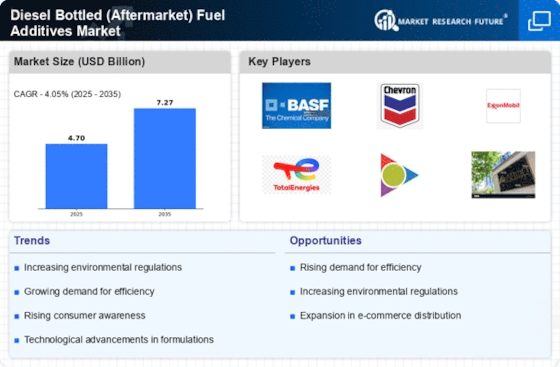Growth of the Automotive Sector
The Global Diesel Bottled Aftermarket Fuel Additives Market Industry is closely linked to the expansion of the automotive sector, particularly in emerging economies. As vehicle ownership increases, so does the demand for diesel fuel and, consequently, fuel additives. This growth is particularly evident in regions where diesel engines dominate commercial transportation. The rising number of diesel vehicles on the road creates a substantial market for aftermarket additives, as consumers seek to maintain engine performance and longevity. This trend is expected to contribute to the market's overall growth, reinforcing the importance of the automotive sector in shaping the Global Diesel Bottled Aftermarket Fuel Additives Market Industry.
Consumer Awareness and Education
Consumer awareness regarding the benefits of diesel fuel additives is a pivotal driver for the Global Diesel Bottled Aftermarket Fuel Additives Market Industry. As more information becomes available about the advantages of using additives, such as improved engine performance and reduced emissions, consumers are more inclined to invest in these products. Educational campaigns by manufacturers and industry associations play a crucial role in disseminating knowledge about the efficacy of fuel additives. This heightened awareness is likely to stimulate demand, thereby fostering growth in the market as consumers prioritize the maintenance and efficiency of their diesel engines.
Rising Demand for Fuel Efficiency
The Global Diesel Bottled Aftermarket Fuel Additives Market Industry experiences a notable surge in demand for fuel efficiency solutions. As diesel prices fluctuate, consumers increasingly seek ways to enhance fuel economy. Fuel additives, which can improve combustion efficiency and reduce emissions, are becoming essential for both commercial and personal vehicles. This trend is underscored by the projected market value of 4.7 USD Billion in 2024, reflecting a growing awareness of the economic benefits associated with fuel-efficient technologies. Consequently, manufacturers are innovating to meet this demand, thereby driving growth in the Global Diesel Bottled Aftermarket Fuel Additives Market Industry.
Market Trends and Growth Projections
The Global Diesel Bottled Aftermarket Fuel Additives Market Industry is poised for substantial growth, with projections indicating a market value of 4.7 USD Billion in 2024 and an anticipated increase to 7.28 USD Billion by 2035. This growth trajectory suggests a compound annual growth rate of 4.05% from 2025 to 2035, reflecting the increasing adoption of fuel additives across various sectors. Factors such as rising fuel prices, stringent environmental regulations, and technological advancements are likely to contribute to this upward trend, positioning the market for continued expansion in the coming years.
Environmental Regulations and Standards
The Global Diesel Bottled Aftermarket Fuel Additives Market Industry is significantly influenced by stringent environmental regulations aimed at reducing vehicle emissions. Governments worldwide are implementing policies that mandate lower emissions from diesel engines, prompting consumers to adopt fuel additives that comply with these standards. For instance, the introduction of cleaner-burning additives aligns with regulations set forth by environmental agencies, fostering a market environment conducive to growth. As the industry adapts to these regulations, the market is expected to expand, with projections indicating a rise to 7.28 USD Billion by 2035, highlighting the critical role of compliance in driving market dynamics.
Technological Advancements in Additives
Technological innovations in fuel additive formulations are propelling the Global Diesel Bottled Aftermarket Fuel Additives Market Industry forward. Advances in chemistry and engineering have led to the development of more effective additives that enhance performance, reduce deposits, and improve fuel stability. These innovations not only cater to the evolving needs of consumers but also address the challenges posed by modern diesel engines. As a result, the market is likely to witness a compound annual growth rate of 4.05% from 2025 to 2035, indicating a robust trajectory fueled by continuous improvement in product offerings and consumer preferences for high-performance solutions.






















